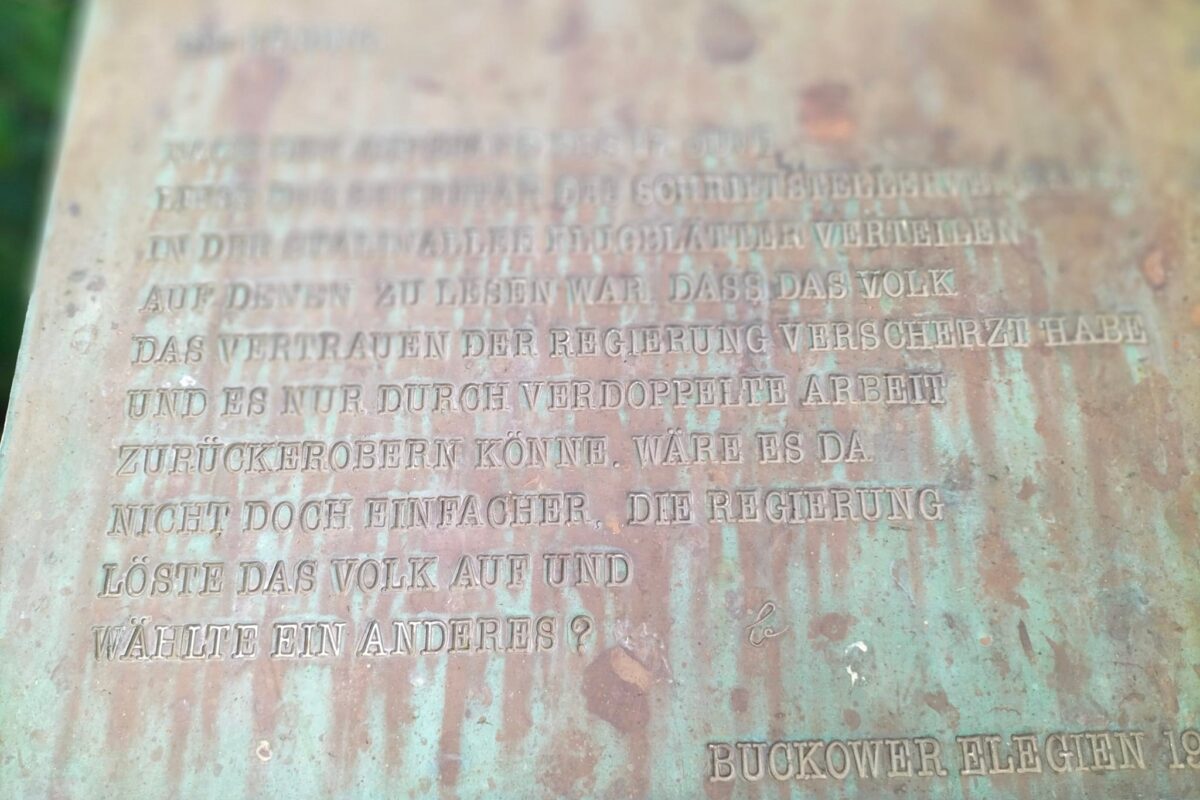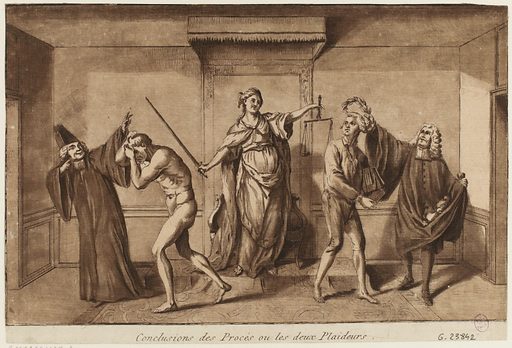On Sunday, 31st July, I visited the Brecht/Weigel house in Buckow as part of a trip organised by the Berlin LINKE Internationals and DSA Berlin (more information at the foot of this article). Inside the house, one subject dominated above all others – the East Berlin workers’ uprising of June 17th 1953.
There are at least three different places in and around the house where you can read Brecht’s poem Die Lösung (The Solution). That’s the one that ends “Would it not in that case be simpler for the government To dissolve the people And elect another?”. The poem was never published in Brecht’s lifetime, eventually appearing in Die Welt in 1959.
Other artefacts show Brecht positioning himself much more guardedly. There are typewritten letters to the government and to SED leader Walter Ulbricht, expressing his concern and pledging his friendship with the Soviet Union. We also see a copy of the front page of the State Newspaper Neues Deutschland in which Brecht is quoted as saying: “the workers’ demonstration was abused for warlike purposes” and “I hope that the provocateurs will be isolated and their networks broken.”
On the other hand, there are also transcripts from discussions in Brecht’s theatre, the Berliner Ensemble, on 17th and 18th June, where he clearly shows support for the demonstrators. We also see reports from his fellow actors and theatre workers who say that some of the quotes attributed to him in the Party media reflected neither his feelings nor his vocabulary.
The 1953 Uprising
Maybe it’s worth briefly explaining the 1953 uprising here. On 16th June, construction workers struck against work quotas. The next day, one million people demonstrated in East Germany, in particular in Berlin. 25,000 people demonstrated, but they were cleared away by Soviet tanks. When Brecht was expressing his friendship with the Soviet Union, he is implicitly supporting this action.
This was one of the first indications that one of the Eastern European “workers’ states”, which had been effectively imposed by the Soviet military after the Second World War, was actually acting against the interest of Eastern European workers. In the “workers’ state” of East Germany, workers were demonstrating against the government for better conditions.
One lesson to be drawn from this action is that the actions required to win reforms in the East were not fundamentally different to those in the West – strike actions and mass demonstrations. It also showed that the Soviet-backed states could deal with opposition just as ruthlessly as the capitalist states of the West.
This is not the place to have a detailed discussion about the class nature of post-war Eastern Europe, but briefly put, in East Germany a small number of people (let’s call them the ruling class) profited from the exploitation of the majority (who we can call the working class). As a State-sponsored playwright, Brecht found himself in an uncomfortable position between both groups.
The social democratic writer Günther Grass satirised Brecht’s dilemma in his play “The Plebians Rehearse the Uprising”. A dramaturg (“Der Chef”, known as The Boss in the English translation), who is clearly modelled on Brecht, is leading his actors in rehearsals for his new version of Corialanus (a play which Brecht did try to rewrite between 1951 and 1953). Meanwhile, real workers come into the theatre to report from a real workers’ uprising which is happening outside the theatre. They ask Der Chef for his support.
Martin Schofield describes what happens next: “The workers … accuse him [The Boss] of wanting to remain in favor with the authorities simply to save his theatre. The Boss tries on his side to involve the rebellious workers in his production, to help them see what went wrong with theirs. For the Boss, integrity resides in sticking to the artifice of of his production rather than in trying to play a part in the real uprising”.
What to make of it all?
First of all, although Brecht maintained an Austrian passport until the end of his life, he genuinely believed that the DDR was the least bad option – a belief that was confirmed by his experience in Hollywood, where he briefly became the eleventh member of the Hollywood Ten (more about this, below).
Secondly, his life in the DDR was one of relative privilege. The State gave him his own theatre, with full artistic control. He could afford this lovely lakeside house in Buckow alongside his Berlin home near Hegel’s graveyard in Chauseestraße.
But thirdly, the DDR was less than a decade old. West Germany had retained much of the old Nazi State apparatus. Nearly 100 former Nazis held high-ranking positions in the Justice Ministry (This was not a temporary phenomenon. Over half of West German lawyers and judges between 1949 and 1973 had been members of Hitler’s party).
This article started as a much shorter post on my facebook page. Reacting to the original post, someone remarked: “BTW Brecht was not allowed to live in West Germany, which tells a lot and is a scandal by itself. Few people of the establishment want to be remembered of this today. (The Trotskyist Ernest Mandel was also not allowed entry to West Germany decades later).”
In contrast, many of the East German leaders had spent the war in exile or in Concentration Camps. This was a country which called itself Communist and anti-fascist, and Brecht still considered himself to be a Communist and anti-fascist.
My friend Victor Grossman defected to the DDR in 1952 after facing a one year prison sentence for having been a member of the US Communist Party. In 1953, he was living in East Berlin. Victor was always a critic of the establishment – East and West, but he is adamant that the uprising was a manoeuvre by the CIA. Now I disagree fundamentally with Victor on this, but it does show that serious socialists were suspicious of the action. It is not too much of a flight of fancy to think that Brecht shared these suspicions.
What did Brecht really think?
We’re unlikely to ever know what Brecht really thought, but I think that both his private talks, as articulated in die Lösung, and his official statements, were made with a degree of sincerity. When workers rose up, he did feel automatic sympathy, but he also knew that the West was determined to destroy the country to which he had chosen to move for political reasons.
So, his reaction was typically Brechtian. Brecht’s plays are littered with opportunists, who ultimately act out of self interest – “Erst kommt das Fressen, dann kommt die Moral” (Food comes first, then morality), as he (or one of his characters) says in the Threepenny Opera.
Whether it’s Macheath in the Threepenny Opera in Victorian London, Mother Courage in the Thirty Years War, Galileo faced with torture and death by the Spanish Inquisition or Schwejk in the Second World War, a recurring theme in Brecht’s plays is the cocky individual who outwits the authorities and survives.
This is, in effect, what happened when Brecht testified before Joe McCarthy’s House Un-American Activities Committee (HUAC) in 1947. Accused of being a Communist, he spent 2 days in court willingly answering the questions put to him with a string of hilarious gibberish, before fleeing the country.
There was a slight difference in Brecht’s attitude to the 1953 uprising. He felt nothing but contempt for his US-American McCarthyite prosecutors. On the other hand, he had something invested in the East German government. But he wasn’t going to put his neck on the line, and ultimately chose to support the DDR against what he saw as the forces of agents of imperialism. Brecht never did speak out publicly in support of the uprising.
But he never destroyed the manuscript of Die Lösung.
We visited the Brecht-Weigel Haus on one of the €9 Travel Ticket tours organised by the Berlin LINKE Internationals and DSA Berlin to discover relatively unknown parts of Germany. Two further trips are planned – to the former concentration camp at Sachsenhausen on 14th August (date tbc) and to the DDR art archive in Beeskow on 21st August. No need to book up. Just turn up at Alexanderplatz station at the time given in the Event description with your €9 ticket.



